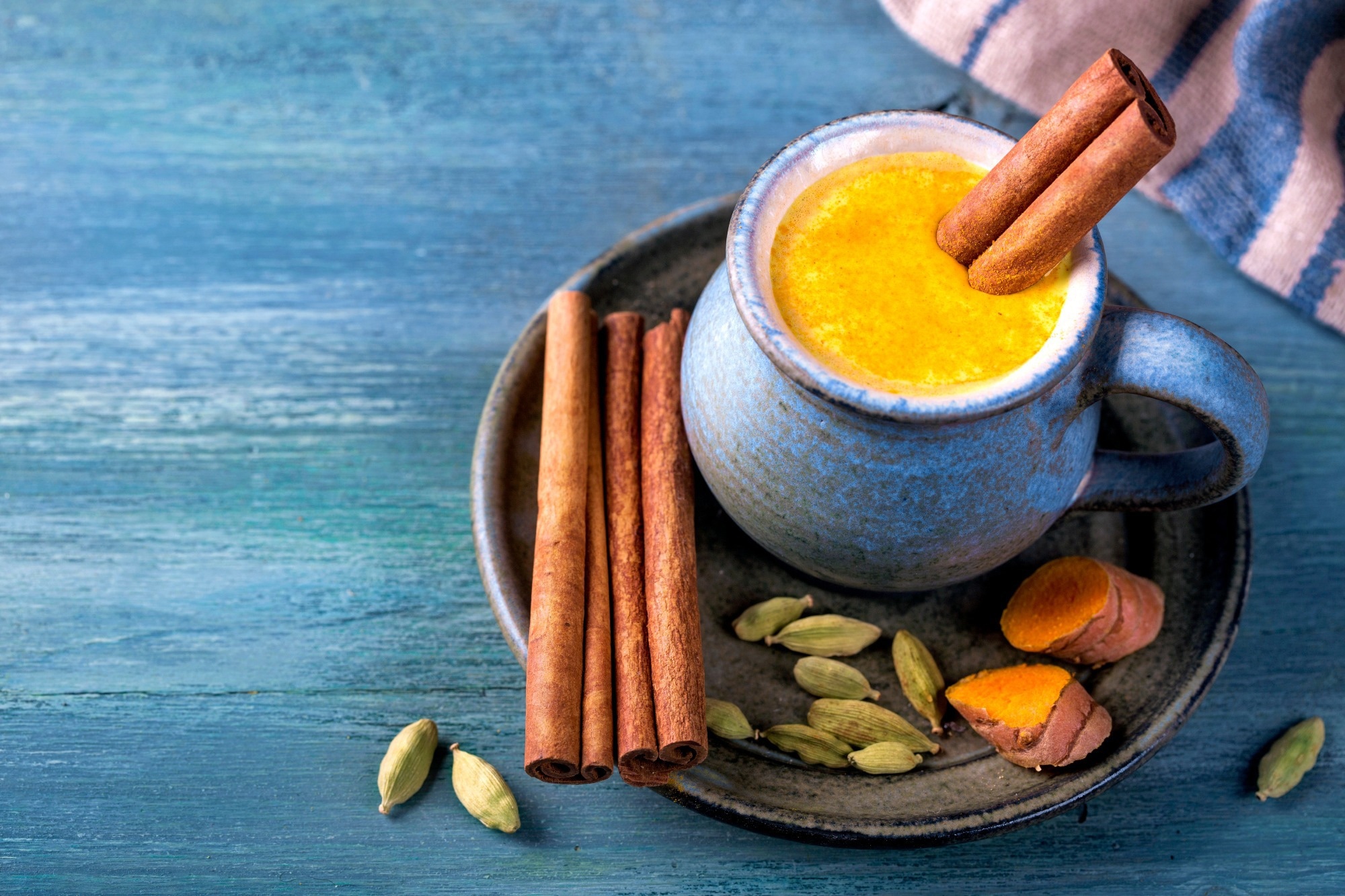T2DM is a metabolic condition characterized by impaired insulin action, which results in high blood glucose levels and consequences such as nephropathy, neuropathy, retinopathy, and micro- and macroangiopathy. It is the primary cause of mortality among diabetes patients, making prevention critical. Treatment comprises pharmaceutical foods and lifestyle adjustments to maintain metabolic regulation and reduce excess body weight. Many patients take dietary supplements to control T2DM, decrease oxidative stress, and prevent complications.
 Review: The Impact of Curcumin, Resveratrol, and Cinnamon on Modulating Oxidative Stress and Antioxidant Activity in Type 2 Diabetes: Moving beyond an Anti-Hyperglycaemic Evaluation. Image Credit: Elena Schweitzer / Shutterstock
Review: The Impact of Curcumin, Resveratrol, and Cinnamon on Modulating Oxidative Stress and Antioxidant Activity in Type 2 Diabetes: Moving beyond an Anti-Hyperglycaemic Evaluation. Image Credit: Elena Schweitzer / Shutterstock
About the systematic review
In the present systematic review, researchers investigated the efficacy of cinnamon, curcumin, and resveratrol as dietary supplements in modifying oxidative stressors and antioxidant activities.
The researchers searched the Scopus, PubMed, and Web of Sciences databases for descriptive studies and randomized controlled trials evaluating the effects of cinnamon, curcumin, and resveratrol on the levels of interleukin 6 (IL-6), high-sensitivity C-reactive protein (hs-CRP), tumor necrosis factor-alpha (TNF-α), malondialdehyde (MDA), and the total antioxidant capacity (TAC). They included studies conducted on adults and published in English in the previous ten years, excluding animal studies, pediatric and adolescent studies, systematic literature reviews, and meta-analytical research. They screened 1,789 records, excluded 1,767, and analyzed the remaining 22.
Antioxidant and anti-inflammatory effects of phytochemicals
Phytochemicals reduced oxidative stress and improved inflammatory parameters, including MDA, TAC, hs-CRP, IL-6, and TNF-α levels. Curcumin, resveratrol, and cinnamon also regulate carbohydrate metabolism, lowering insulin, glycated hemoglobin, and blood glucose concentrations. In addition, they mediate lipid metabolic markers, reducing triglycerides (TG) and low-density lipoprotein-cholesterol (LDL-c), while elevating high-density lipoprotein-cholesterol (HDL-c) levels.
Reactive oxygen species (ROS) levels enhance oxidative stress-related inflammation. Curcumin lowers the nicotinamide adenine dinucleotide phosphate (NADP)/NADPH ratio and thus ROS levels. Cinnamon lowers ROS expression by decreasing toll-like receptor 4/NADPH oxidase 4 (TLR4/NOX4) levels. Resveratrol has an anti-inflammatory impact by raising nuclear factor erythroid 2-related factor 2 (NRF2) expression and decreasing the nuclear factor kappa B (NF-κB) activity. Curcumin reduces inflammation by increasing protein kinase B/glycogen synthase Kinase-3β (AKT/GSK-3β) activity and lowering IL-6 and IL-1β levels. Cinnamon lowers the NF-κB/glutaredoxin ratio.
Curcumin research in T2DM management
Curcumin significantly reduced MDA levels in 14 T2DM patients with chronic kidney disease (CKD). Over eight weeks, 42 patients with T2DM and hyperlipidemia consumed 2,100 mg of curcumin, which boosted TAC levels while decreasing MDA and hs-CRP. Curcumin in a 1,000 mg dose was administered to 60 patients with T2DM and coronary heart disease over 12 weeks, whereas 100 overweight or obese participants with T2DM received 300 mg over three months. To enhance TAC levels and lower MDA and hs-CRP levels, 44 individuals with T2DM received 1,500 mg of curcumin over ten weeks and 80 mg of the phytochemical over 12 weeks, respectively.
Curcumin, a chemical found in turmeric's rhizome, exerts antioxidant, anti-inflammatory, antibacterial, anticancer, anti-rheumatic, immunomodulatory, anti-hyperglycemic, and cardio-renal-hepatoprotective effects. It activates peroxisome proliferator-activated receptor-gamma (PPAR-γ), lowers fasting glucose, glycated hemoglobin, and TNF-α, and improves lipid metabolism.
Resveratrol and cinnamon research in T2DM management
Resveratrol considerably lowered many T2DM indicators, including MDA, TNF-alpha, IL-6, and hs-CRP, among individuals aged 18 to 70 years. Resveratrol 200 mg for 24 weeks significantly lowered these indicators. Similarly, 800 mg of resveratrol for two months boosted TAC levels while decreasing MDA and hs-CRP. A 1,000 mg dosage of resveratrol likewise boosted TAC levels while decreasing hs-CRP. Red wine, berries, peanuts, and chocolate contain resveratrol, which enhances oxidative-antioxidative balance and regulates signaling pathways by increasing glutathione levels and preserving cellular redox equilibrium. However, further meta-analytical research could confirm its efficacy in T2DM. Resveratrol recipients had a two-fold drop in micro-ribonucleic acid (miRNA)-21, -34a, -192, and -375 expression, a lowered blood protein carbonyl concentration, and a higher total thiol content.
Over 12 weeks, 1,000 mg of cinnamon significantly reduced MDA levels in 25 T2DM patients aged 49 years. Cinnamon 3,000 mg over eight weeks lowered hs-CRP, IL-6, and TNF-α levels. Cinnamon polyphenols such as catechin, procyanidin, cinnamic acid, and flavones lower fasting glucose, TC, LDL, and TG by altering hepatic glucose homeostasis and inhibiting phosphoenolpyruvate carboxykinase and glucose-6-phosphatase (G6Pase), which regulate gluconeogenesis.
The systematic review found that incorporating cinnamon, curcumin, and resveratrol into meals can enhance metabolic regulation and organismal homeostasis in T2DM patients. However, contradictory findings imply that more study into the efficacy of phytochemicals is needed, with curcumin and resveratrol being the most beneficial. There is no scientific consensus on the therapeutic efficacy of dietary supplements, long-term synthetic usage, and large dosages of the phytochemicals.
Journal reference:
- Banaszak, M.; Górna, I.; Wo´zniak, D.; Przysławski, J.; Drzymała-Czyz, S. The Impact of ˙ Curcumin, Resveratrol, and Cinnamon on Modulating Oxidative Stress and Antioxidant Activity in Type 2 Diabetes: Moving beyond an Anti-Hyperglycaemic Evaluation. Antioxidants 2024, 13, 510. DOI: 10.3390/antiox13050510, https://www.mdpi.com/2076-3921/13/5/510